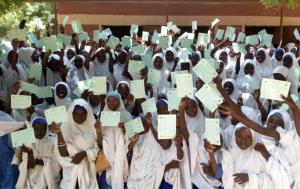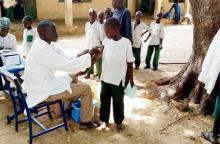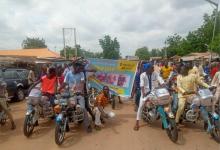Yellow Fever Preventive Mass Vaccination Campaign kicks off in Katsina State, others to follow
Katsina, 9 October 2019 - As part of an effort towards eliminating Yellow Fever epidemics in Nigeria, the Government in collaboration with the World Health Organization (WHO), UNICEF, Gavi, and other key partners, officially commenced Phase 3 of its planned Preventive Mass Vaccination Campaign (PMVC) in Katsina State.
The Phase 3 PMVC is aimed to protect more than 20 million people and is an important step towards protecting against yellow fever outbreaks across the country. Furthermore, the PMVC is part of the global strategy to Eliminate Yellow Fever Epidemics (EYE) by 2026.
Flagged off on 28 September 2019, the campaign will cover 33 out of 34 Local Government Areas (LGAs) in Katsina State. PMVCs are also scheduled for Anambra, Ekiti, Rivers, and Borno States in November and December 2019. In 2018, a reactive yellow fever campaign was conducted in Danja LGA, Katsina following an outbreak.
Speaking during the flag-off ceremony, the Deputy Governor of Katsina State, Alhaji Mannir Yakubu said, “It is important to know that Yellow Fever can be prevented and the most cost-effective means is by taking a single dose of yellow fever vaccine. To achieve a successful yellow fever campaign, it is important to note that all supplies including vaccines, syringes and data tools have been distributed to all LGAs.”
The Deputy Governor used the opportunity to remind all LGA Chairmen to attend evening review meetings to provide oversight during the campaigns.
“I am also calling on traditional and religious leaders to continue their good work of engaging with their communities to guide against vaccine refusal and hesitancy. I can assure you that the government is committed to strengthening the health system and improving both preventive and curative health care to meet the yearnings of Katsina State citizens. Finally, I would like to appeal to all heads of households and other individuals in schools or communities to ensure that all eligible target population receive this very important vaccine”, he added.
With support from WHO, and more than 50 partners, Nigeria developed a 9-year strategic elimination plan to improve yellow fever diagnosis capacity, childhood immunization and overall population immunity in all states. Launched in 2018 by the WHO Director General, Dr Tedros Adhanom and the Africa Region Director Dr Matshidiso Moeti, Nigeria is a high priority country for the EYE Strategy and it is expected that more than 75 million people will be protected against yellow fever in the country by the end of 2021. Infants from 09 months to adults aged 44 years are eligible for this vaccination.
Dr Fiona Braka, WHO Team Lead for the Expanded Programme on Immunization (EPI) says, “WHO is committed to ensuring many Nigerians are well protected against the deadly virus. We will provide as much support the Government needs to ensure successful and smooth implementation of this campaign.”
According to the Nigeria Centre for Disease Control (NCDC), in a yellow fever situation report published 31 July 2019, the EPI summary shows all states including the Federal Capital Territory (FCT) have reported at least one suspected case and that twenty-one States (21) have recorded at least one confirmed case of yellow fever since the beginning of the outbreak in September, 2017.
More recently, since September 109 there has been an intensification of activities to respond to a new outbreak with over 200 suspected cases linked to Bauchi. A total of 24 (36.4%) cases have been confirmed in Nigerian testing Laboratories, and a total of 15 deaths have been recorded among suspected cases: Bauchi (13), Kano (1), Gombe(1), with Case fatality rate(CFR) of 6.5%. (Source: NCDC).
Yellow fever is an acute viral haemorrhagic disease transmitted by infected mosquitoes. The "yellow" in the name refers to the jaundice that affects some patients. Symptoms of yellow fever include fever, headache, jaundice, muscle pain, nausea, vomiting and fatigue. Vaccination is the most important means of preventing yellow fever. A single dose of yellow fever vaccine is sufficient to provide sustained immunity and life-long protection against yellow fever disease. A booster dose of the vaccine is not needed to prevent further spread, pre-emptive vaccination campaigns are required in neighbouring areas not directly affected by the ongoing yellow fever outbreak and reactive campaigns, but face heightened risk and vulnerability.
Related links: WHO Factsheet on Yellow Fever
Technical Contacts:
Dr Richard Banda; Email: Bandari [at] who.int (Bandari[at]who[dot]int); Tel: +234 803 5354 875
Dr Anne Jean Baptiste; Email: jeana [at] who.int (jeana[at]who[dot]int); Tel: +234 813 1736 281





